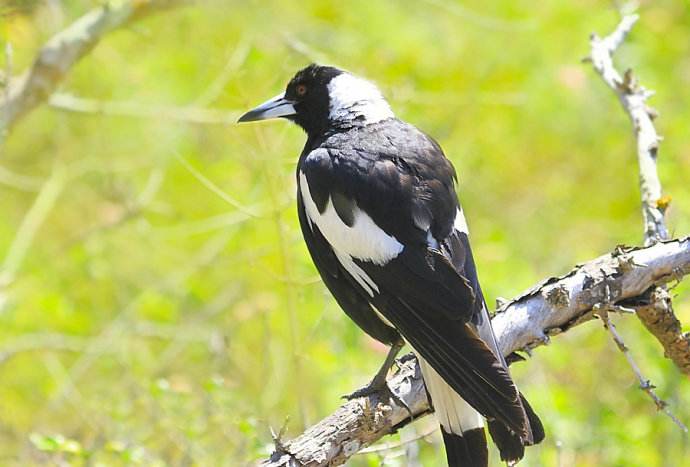(单词翻译:单击)
听力文本
This is Scientific American — 60-Second Science. I'm Jason G. Goldman.
Got a minute?
Of the many thousands of species of birds on Earth, only about 25 are known to do something special with their food—they dunk it in water before eating.
Nobody knows for sure why the birds do it. It might moisten foods for easier eating. Or it might wash away nasty-tasting chemicals. The behavior is seen most often in super smart species, like crows. And now it's been observed for the first time in a bird called the Australian magpie.
"We were very, very lucky to see it. It was entirely by chance." University of Cambridge zoologist Eleanor Drinkwater.
"And so, on a day to day basis, we'd get up and we would essentially spend hours and hours following these different families of magpies around the place, and tempt them towards us and then see how they reacted when we presented them with different foods."
The researchers offered an adult male magpie a mountain katydid, an insect that's presumed to be distasteful. It's thought that the insect defends itself against being gobbled up by secreting a bitter substance from underneath its wings as well as by vomiting a bitter-tasting cocktail.
"This one individual comes up and takes the katydid that we presented and kind of waddles off, and then goes and kind of plops it in a little stream that was behind us. We were kind of watching this together and looking at each other, like, this is a bit interesting. Haven't seen this before."

But then something even more surprising happened. The magpie dropped the wet katydid on the ground and hopped away. A few minutes later, a juvenile magpie approached, dunked the katydid once again in the puddle, and then gobbled it up. The observations were described in the journal Australian Field Ornithology.
Drinkwater thinks what they saw might be an example of social learning in this species.
"To us, it kind of appeared to be the case that it could be food washing. That would make sense within the context of this particular insect."
While the behaviors are hard to interpret, she says that she and her team reported these observations in hopes that other researchers might investigate the behavior further.
"We were just very, very fortunate to be in the right place at the right time to see this interesting behavior. And in the current day and age, there are loads of people with iPhones and cameras who I'm sure have also captured all sorts of weird and wonderful animal behavior, which might not be common knowledge to the scientific community."
And unless those folks think to share their photos and videos with experts, who knows what discoveries are out there remaining to be made.
Thanks for the minute for Scientific American — 60-Second Science Science. I'm Jason G. Goldman.
参考译文
这里是科学美国人——60秒科学。我是杰森·古德曼。
有一分钟时间吗?
在地球上数千种鸟类中,只有已知约25种鸟类对食物做特殊处理——它们在食用前会用水泡一下食物。
没有人确切知道这些鸟类为什么这样做。可能是把食物弄湿,以方便食用。或者是为了洗掉味道不好的化学物质。这种行为在乌鸦这类超级聪明的物种中最为常见。现在,人们首次在澳洲喜鹊身上发现了这种行为。
“我们真的非常幸运能看到这些。这完全是偶然。”剑桥大学的动物学家埃莉诺·德林克沃特说到。
“每天我们起床以后,会花几个小时的时间追踪附近不同的喜鹊家族,把它们引诱过来,以观察它们对我们提供的不同食物的反应。”
研究人员给一只成年雄性喜鹊准备了一只山蝈蝈,这种昆虫被认为是难吃的食物。人们认为这种昆虫为了防止自己被吃掉,会从翅膀下分泌出一种苦味物质,而且还会吐出苦味混合物。
“这只雄性喜鹊过来叼起我们给它的蝈蝈,然后摇摇摆摆地走了,然后它把蝈蝈扑通一声放进我们身后的小溪中。我们一起观察着这一切,并面面相觑,那是一个有些有趣的场面。我们以前从未看到过这种情况。”
后来甚至发生了更令人吃惊的事情。那只喜鹊把浸湿了的蝈蝈放在地上,然后就跳着走了。几分钟以后,一只年幼喜鹊过来,把蝈蝈又放进水坑里浸湿了一遍,然后吞掉了它。这些观察结果发表在《澳大利亚野生鸟类学》期刊上。
埃莉诺·德林克沃特认为,他们看到的可能是这种鸟类的一种社会学习。
“在我们看来,这看起来像是在洗食物。考虑到这种特殊昆虫的情况,那是可以说得通的。”
虽然这些行为很难解释,但是德林克沃特说,她和团队报告了这些观察结果,希望其他研究者能进一步研究这种行为。
“能在正确的时间和地点观察到这种有趣的行为,我们真的非常幸运。在当今时代,我肯定有很多拿着iPhone和相机的人也在捕捉动物各种怪异和神奇的行为,而这些行为可能连科学界都不了解。”
除非他们想与专家分享他们的图片和视频,否则谁能知道还有多少奇异之事在等待着被发现呢。
谢谢大家收听科学美国人——60秒科学。我是杰森·古德曼。
译文为可可英语翻译,未经授权请勿转载!
重点讲解
重点讲解:
1. for sure 无疑;肯定;
例句:No one can answer that for sure.
没有人能很肯定地回答这个问题。
2. gobble up 贪婪地吃;狼吞虎咽;
例句:Only then did he gobble up the food until all he could do was fall asleep.
他狼吞虎咽地吃了那些食物,接着就去睡觉了。
3. make sense 可以理解;讲得通;
例句:On the face of it that seems to make sense. But the figures don't add up.
乍一看,似乎讲得通,但这些数字对不起来。
4. all sorts of 各种各样的;形形色色的;
例句:We associated with all sorts of people.
我们与各种各样的人都打交道。


